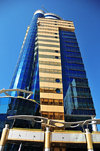 Ramadan
is the ninth month of the Muslim calendar. The Month of Ramadan is also
when it is believed the Holy Quran "was sent down from heaven, a guidance
unto men, a declaration of direction, and a means of Salvation"
Ramadan
is the ninth month of the Muslim calendar. The Month of Ramadan is also
when it is believed the Holy Quran "was sent down from heaven, a guidance
unto men, a declaration of direction, and a means of Salvation"
It is during this month that Muslims fast. It is called the Fast of Ramadan and lasts the entire month. Ramadan is a time when Muslims concentrate on their faith and spend less time on the concerns of their everyday lives. It is a time of worship and contemplation. The Fast was first of all modelled on the Jewish day of Atonement (Surah 2, 183) and was held in the month of Muharram. Later however it was changed to the month of Ramadan.
During the Fast of Ramadan strict restraints are placed on the daily lives of Muslims. They are not allowed to eat or drink during the daylight hours. Smoking and sexual relations are also forbidden during fasting. Even the insertion of medicine in ear, nose or head wound, or an injection, are considered as invalidating the fast. At the end of the day the fast is broken with prayer and a meal called the iftar. In the evening following the iftar it is customary for Muslims to go out visiting family and friends. The fast is resumed the next morning.
Girls often start to fast for a few days when they are nine years old and boys at the age of twelve. A pregnant woman is permitted to break the fast if she feels her child is in danger. Women do not fast during menstruation, although they should make up the time by fasting at some other time during the year. Those who are travelling, the elderly, the sick, nursing women and soldiers engaged in the holy war (Jihad) are not compelled to fast.
According to the Holy Quran:
One may eat and drink at any time during the night "until you can plainly distinguish a white thread from a black thread by the daylight: then keep the fast until night"The good that is acquired through the fast can be destroyed by five things -
- the telling of a lie
- slander
- denouncing someone behind his back
- a false oath
- greed or covetousness
During Ramadan, it is common for Muslims to go to the Mosque and spend several hours praying and studying the Quran. In addition to the five daily prayers, during Ramadan Muslims recite a special prayer called the Taraweeh prayer (Night Prayer). The length of this prayer is usually 2-3 times as long as the daily prayers. Some Muslims spend the entire night in prayer
On the evening of the 27th day of the month, Muslims celebrate the Laylat-al-Qadr (the Night of Power). It is believed that on this night Muhammad first received the revelation of the Holy Quran in a cave on Mount Hira, near Mecca in the year AD 610. The Quran states that this night is better than a thousand months. And according to the Quran, this is when God determines the course of the world for the following year
It should be noted that Islam in general is not an ascetic religion. Neither does it glory in the good things given by God to men. The fullness of the life of the Prophet, for example, is contrasted with the prevailing idea among Muslims of Jesus as a wandering monk who renounced the things of the world. The annual fast is rather to be seen as a temporary renunciation of what are normally the good gifts of God in order the better to recognise man’s true relationship to God. This is illustrated in the words of the prayer which accompany the ceremonial breaking of the fast each evening: “Oh God, I fasted for Thy sake and had faith in Thee, and confined in Thee; and now I break the fast with the food Thou givest. Accept this act.”
When the fast ends (the first day of the month of Shawwal) it is celebrated for three days in a holiday called Eid-al-Fitr (the Feast of Fast Breaking). Gifts are exchanged. Friends and family gather to pray in congregation and for large meals. In some cities fairs are held to celebrate the end of the Fast of Ramadan.